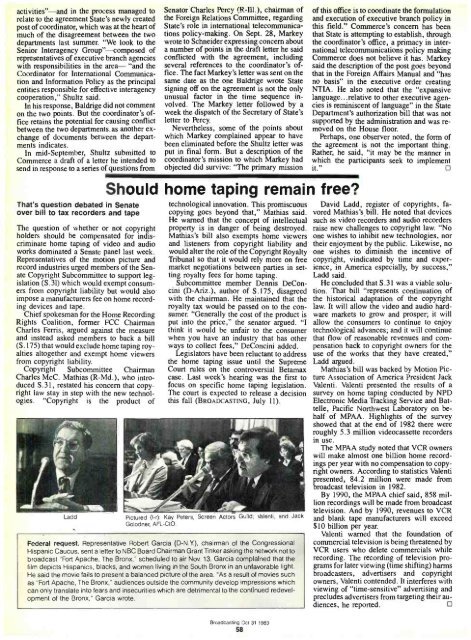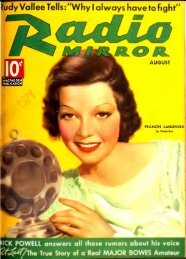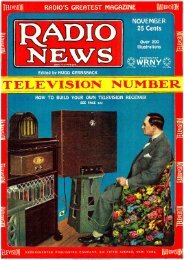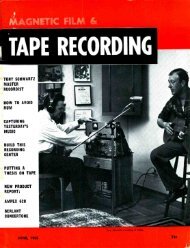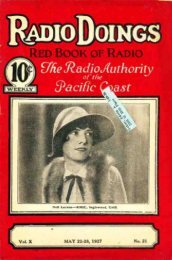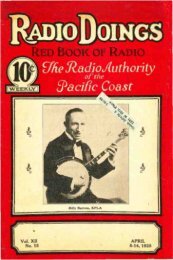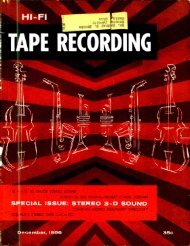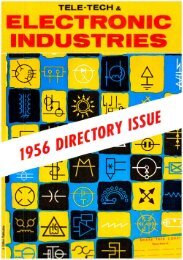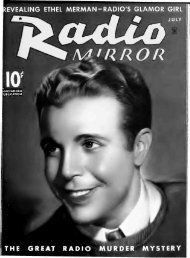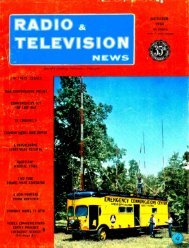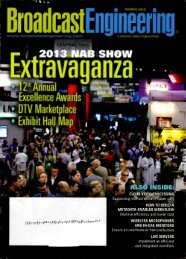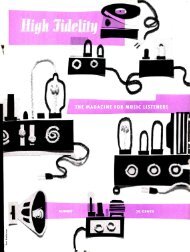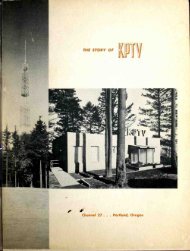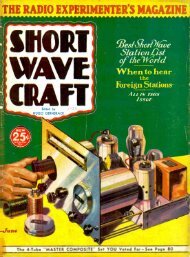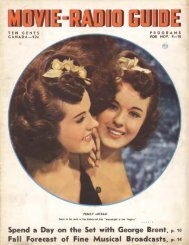Broadcasting Oct 31 - American Radio History
Broadcasting Oct 31 - American Radio History
Broadcasting Oct 31 - American Radio History
You also want an ePaper? Increase the reach of your titles
YUMPU automatically turns print PDFs into web optimized ePapers that Google loves.
activities" -and in the process managed to<br />
relate to the agreement State's newly created<br />
post of coordinator, which was at the heart of<br />
much of the disagreement between the two<br />
departments last summer. "We look to the<br />
Senior Interagency Group " -composed of<br />
representatives of executive branch agencies<br />
with responsibilities in the area - "and the<br />
Coordinator for International Communica-<br />
tion and Information Policy as the principal<br />
entities responsible for effective interagency<br />
cooperation," Shultz said.<br />
In his response, Baldrige did not comment<br />
on the two points. But the coordinator's of-<br />
fice retains the potential for causing conflict<br />
between the two departments_as another ex-<br />
change of documents between the depart-<br />
ments indicates.<br />
In mid- September, Shultz submitted to<br />
Commerce a draft of a letter he intended to<br />
send in response to a series of questions from<br />
Should<br />
That's question debated in Senate<br />
over bill to tax recorders and tape<br />
The question of whether or not copyright<br />
holders should be compensated for indis-<br />
criminate home taping of video and audio<br />
works dominated a Senate panel last week.<br />
Representatives of the motion picture and<br />
record industries urged members of the Sen-<br />
ate Copyright Subcommittee to support leg-<br />
islation (S.<strong>31</strong>) which would exempt consum-<br />
ers from copyright liability but would also<br />
impose a manufacturers fee on home record-<br />
ing devices and tape.<br />
Chief spokesman for the Home Recording<br />
Rights Coalition, former FCC Chairman<br />
Charles Ferris, argued against the measure<br />
and instead asked members to back a bill<br />
(S.175) that would exclude home taping roy-<br />
alties altogether and exempt home viewers<br />
from copyright liability.<br />
Copyright Subcommittee Chairman<br />
Charles McC. Mathias (R -Md.), who intro-<br />
duced S.<strong>31</strong>, restated his concern that copy-<br />
right law stay in step with the new technol-<br />
ogies. "Copyright is the product of<br />
Senator Charles Percy (R -Ill.), chairman of<br />
the Foreign Relations Committee, regarding<br />
State's role in international telecommunica-<br />
tions policy- making. On Sept. 28, Markey<br />
wrote to Schneider expressing concern about<br />
a number of points in the draft letter he said<br />
conflicted with the agreement, including<br />
several references to the coordinator's of-<br />
fice. The fact Markey's letter was sent on the<br />
same date as the one Baldrige wrote State<br />
signing off on the agreement is not the only<br />
unusual factor in the time sequence in-<br />
volved. The Markey letter followed by a<br />
week the dispatch of the Secretary of State's<br />
letter to Percy.<br />
Nevertheless, some of the points about<br />
which Markey complained appear to have<br />
been eliminated before the Shultz letter was<br />
put in final form. But a description of the<br />
coordinator's mission to which Markey had<br />
objected did survive: "The primary mission<br />
home taping remain free?<br />
technological innovation. This promiscuous<br />
copying goes beyond that," Mathias said.<br />
He warned that the concept of intellectual<br />
property is in danger of being destroyed.<br />
Mathias's bill also exempts home viewers<br />
and listeners from copyright liability and<br />
would alter the role of the Copyright Royalty<br />
Tribunal so that it would rely more on free<br />
market negotiations between parties in set-<br />
ting royalty fees for home taping.<br />
Subcommittee member Dennis DeCon-<br />
cini (D- Ariz.), author of S.175, disagreed<br />
with the chairman. He maintained that the<br />
royalty tax would be passed on to the con-<br />
sumer. "Generally the cost of the product is<br />
put into the price," the senator argued. "I<br />
think it would be unfair to the consumer<br />
when you have an industry that has other<br />
ways to collect fees," DeConcini added.<br />
Legislators have been reluctant to address<br />
the home taping issue until the Supreme<br />
Court rules on the controversial Betamax<br />
case. Last week's hearing was the first to<br />
focus on specific home taping legislation.<br />
The court is expected to release a decision<br />
this fall (BROADCASTING, July 11).<br />
Ladd Pictured (I -r): Kay Peters, Screen Actors Guild; Udlenti, and Jack<br />
Golodner, AFL -CIO.<br />
Federal request. Representative Robert Garcia (D-N.Y.), chairman of the Congressional<br />
Hispanic Caucus, sent a letter to NBC Board Chairman Grant Tinker asking the network not to<br />
broadcast "Fort Apache, The Bronx," scheduled to air Nov 13. Garcia complained that the<br />
film depicts Hispanics, blacks, and women living in the South Bronx in an unfavorable light.<br />
He said the movie fails to present a balanced picture of the area. As a result of movies such<br />
as "Fort Apache, The Bronx," audiences outside the community develop impressions which<br />
can only translate into fears and insecurities which are detrimental to the continued redevel-<br />
opment of the Bronx," Garcia wrote.<br />
<strong>Broadcasting</strong> <strong>Oct</strong> <strong>31</strong> 1983<br />
58<br />
of this office is to coordinate the formulation<br />
and execution of executive branch policy in<br />
this field." Commerce's concern has been<br />
that State is attempting to establish, through<br />
the coordinator's office, a primacy in inter-<br />
national telecommunications policy making<br />
Commerce does not believe it has. Markey<br />
said the description of the post goes beyond<br />
that in the Foreign Affairs Manual and "has<br />
no basis" in the executive order creating<br />
NTIA. He also noted that the "expansive<br />
language...relative to other executive agen-<br />
cies is reminiscent of language" in the State<br />
Department's authorization bill that was not<br />
supported by the administration and was re-<br />
moved on the House floor.<br />
Perhaps, one observer noted, the form of<br />
the agreement is not the important thing.<br />
Rather, he said, "it may be the manner in<br />
which the participants seek to implement<br />
it."<br />
David Ladd, register of copyrights, fa-<br />
vored Mathias's bill. He noted that devices<br />
such as video recorders and audio recorders<br />
raise new challenges to copyright law. "No<br />
one wishes to inhibit new technologies, nor<br />
their enjoyment by the public. Likewise, no<br />
one wishes to diminish the incentive of<br />
copyright, vindicated by time and exper-<br />
ience, in America especially, by success,"<br />
Ladd said.<br />
He concluded that S.<strong>31</strong> was a viable solu-<br />
tion. That bill "represents continuation of<br />
the historical adaptation of the copyright<br />
law. It will allow the video and audio hard-<br />
ware markets to grow and prosper; it will<br />
allow the consumers to continue to enjoy<br />
technological advances; and it will continue<br />
that flow of reasonable revenues and com-<br />
pensation back to copyright owners for the<br />
use of the works that they have created,"<br />
Ladd argued.<br />
Mathias's bill was backed by Motion Pic-<br />
ture Association of America President Jack<br />
Valenti. Valenti presented the results of a<br />
survey on home taping conducted by NPD<br />
Electronic Media Tracking Service and Bat-<br />
telle, Pacific Northwest Laboratory on be-<br />
half of MPAA. Highlights of the survey<br />
showed that at the end of 1982 there were<br />
roughly 5.3 million videocassette recorders<br />
in use.<br />
The MPAA study noted that VCR owners<br />
will make almost one billion home record-<br />
ings per year with no compensation to copy-<br />
right owners. According to statistics Valenti<br />
presented, 84.2 million were made from<br />
broadcast television in 1982.<br />
By 1990, the MPAA chief said, 858 mil-<br />
lion recordings will be made from broadcast<br />
television. And by 1990, revenues to VCR<br />
and blank tape manufacturers will exceed<br />
$10 billion per year.<br />
Valenti warned that the foundation of<br />
commercial television is being threatened by<br />
VCR users who delete commercials while<br />
recording. The recording of television pro-<br />
grams for later viewing (time shifting) harms<br />
broadcasters, advertisers and copyright<br />
owners, Valenti contended. It interferes with<br />
viewing of "time- sensitive" advertising and<br />
precludes advertisers from targeting their au-<br />
diences, he reported.


